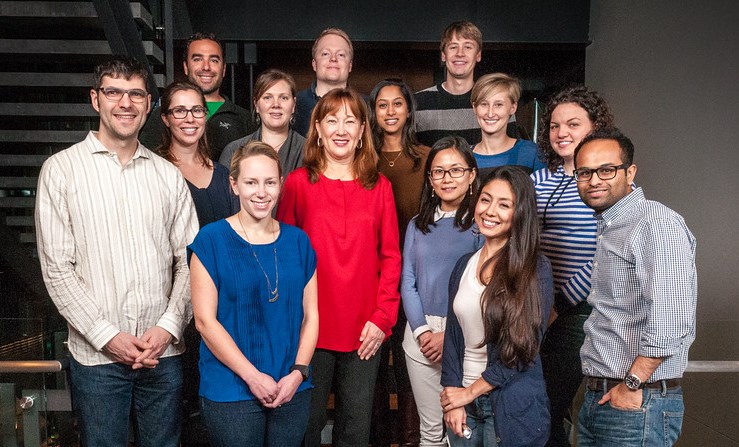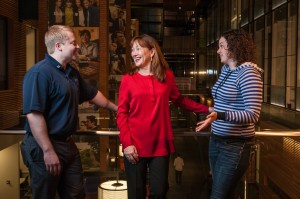Foster MBA class explores entrepreneurship through the investor’s eyes
 How to be a better entrepreneur? You might start with understanding what investors are looking for.
How to be a better entrepreneur? You might start with understanding what investors are looking for.
That’s the insight behind the Foster School’s distinctive Angel Investing course, a year-long practicum offered to a select group of advanced MBAs by the Buerk Center for Entrepreneurship.
Actually, practicum may not be strong enough a word for what occurs over the course of this immersion into the world of early stage entrepreneurial investing.
It begins in the classroom with the principles of investing and how to spot a viable startup team, opportunity and technology. And then pairs of students embed with one of seven Seattle angel groups. Alongside the pros, they hear pitches, perform the due diligence, and eventually invest real money, on behalf of the University of Washington, in one or two startups that show the most promise.
This year, the class invested $50,000 in C-SATS, a Seattle startup using online crowd-sourcing to accurately and inexpensively assess, via video, the skill of surgeons and other medical practitioners.
The point of the class, though, is not only to make money on an early stage investment or two.
“A principle I teach is that if you want to be a successful entrepreneur, you have to understand your market and your audience,” says Susan Preston, the Buerk Endowed Fellow for Entrepreneurship at Foster. “One of your first audiences is investors. So we try to understand how they think when they’re considering an investment. The learning curve is massive for everyone.”
Expert instructor
 If you engineered the perfect instructor for such a course, you’d come pretty close to Preston. A general partner of the CalCEF Clean Energy Angel Fund and managing member of the Seattle Angel Fund, Preston is also co-founder of the nation’s first all-women angel investing group (Seraph Capital), an advisor to the National Science Foundation, a former entrepreneur-in-residence at the Kauffman Foundation, author of two books on entrepreneurial financing, and architect of a pending federal bill on private equity investing.
If you engineered the perfect instructor for such a course, you’d come pretty close to Preston. A general partner of the CalCEF Clean Energy Angel Fund and managing member of the Seattle Angel Fund, Preston is also co-founder of the nation’s first all-women angel investing group (Seraph Capital), an advisor to the National Science Foundation, a former entrepreneur-in-residence at the Kauffman Foundation, author of two books on entrepreneurial financing, and architect of a pending federal bill on private equity investing.
“I’ve been living and breathing this for almost two decades,” Preston says.
A self-described opportunistic risk taker, she jumped at the chance to take over this unique course created and taught at Foster for its first two years by Robert Wiltbank (PhD 2003), a professor of strategy and entrepreneurship at Willamette University and partner at Montlake Capital.
Preston has been energized by her first year teaching the class.
“I really enjoy the students and their energy,” she says. “They are demanding, because they want to get their money’s worth out of every credit. And I deeply respect that. It’s wonderful to see that level of interest and commitment.”
Interest and commitment
Esther Perman (MBA 2015), a member of last year’s class, typifies that entrepreneurial zeal. She was a UW Business Plan Competition finalist, a Gates Fellow in Innovation and Entrepreneurship at the Technology Alliance, president of the Foster School Entrepreneurship and Venture Capital Club, and runner-up at the International Venture Capital Investment Competition. “Entrepreneurship is pretty much where I planted my flag,” says Perman, who came to Foster from a biofuel startup and hopes to leverage her education into a startup of her own someday.
She was in good company. “Most of us in the class aspire to either start or work for an early stage company,” says Greg Akselrod (Evening MBA 2015), a Microsoft program manager with entrepreneurial ambitions. “We saw the class as an opportunity to view entrepreneurship from the other side. By seeing how investors react to so many different entrepreneurial pitches, we learned to pattern match to see, oh, this is what they’re looking for.”
For Kate Thorson (MBA 2015), whose background is in global health, the Angel Investing class brought to life all of the core components of the Foster MBA. “By interacting with entrepreneurs and evaluating real companies from an investor perspective, we learned to grasp the whole picture of a business—from the broader economic context and the contours of the individual industries to company strategies, financial viability and makeup of the team,” she says.
“…With actual investment on the line.”
1 Response
Leave a Reply
You must be logged in to post a comment.

This Angel Investing course sounds like a great opportunity! The principles of investment are often key to any successful entrepreneurial endeavors. Good post!